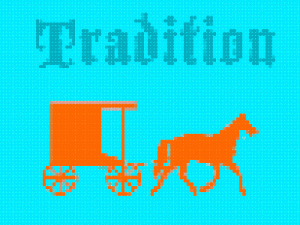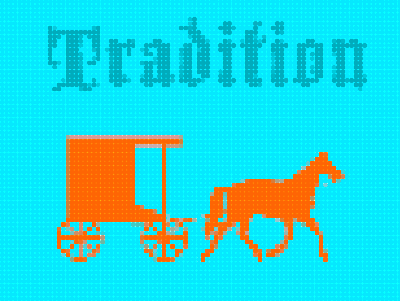 The Appeal To Common Practice simply asks you to accept something because “everybody does it” Here’s an example of it:
The Appeal To Common Practice simply asks you to accept something because “everybody does it” Here’s an example of it:
Director Jones is in charge of running a state waste management program. When it is found that the program is rife with corruption, Jones says “This program has its problems, but nothing goes on in this program that doesn’t go on in all state programs.” (Source: 42 Fallacies)
The Appeal To Tradition is similar, but has time on its side, asking you to accept something because “it’s always been done this way.” The persuasive allure of traditions or common practices is indeed so powerful that the recovery culture goes to great lengths to portray their methods as the norm, even when reality shows that they are not. For example, at any given moment 3/4 of americans who’ve ever had alcohol problems never receive any treatment or attend 12-step meetings, yet 75% of them are problem free at any given time! You wouldn’t know this by listening to addiction propagandists who are constantly screaming that the only way to overcome such a problem is with treatment and 12-step involvement, and that anyone who doesn’t follow strictly adhere to the ways of the recovery culture will die of addiction.
The recovery culture lets us know how much stock they put in the persuasiveness of Appeals To Tradition and Common Practice when they state that AA is “the last house on the block” or that you’re doomed to “jails, institution, or death” without the 12-steps. They want you to know in no uncertain terms that their way of doing things has been and forever will be the only way.
But just because something has been common doesn’t mean it’s necessarily right; the best way of doing things; or even holds any value whatsoever. Horse and buggy was the most popular mode of transportation – until cars were invented. Slavery was common practice – until public opinion could be shifted against it. And I know it’s an overused example, but bloodletting was the traditional medical practice for 2000 years – until people began to realize how harmful it truly was and developed technologies to replace it. Just because everyone does something a certain way, no matter how long it’s been done, doesn’t logically give us cause to accept it – nor does it prove anything other than popularity.
Here’s how I see the fallacy in use in the great addiction debate:
AA’s been around for 75 years – so it must work.
And bloodletting’s been around for 26 times as long – should I believe bloodletting is a sound practice?
10,000 treatment centers use disease based methods and twelve step based counseling.
Uh huh. And 10,000 treatment centers fail to beat rates of natural recovery every single day.
Everyone recommends abstinence for people with addictions – you don’t wanna chance it with moderation, do you?
Yes, you’ve scared everyone who goes through your recovery system into believing that moderation is impossible, and you’ve denied the existence of successful moderate users; and everyone who’s stayed on to be the public face of your system is abstinent because they’re the only ones who will fit your all-or-nothing view – but that doesn’t mean that moderate users don’t exist, and it doesn’t mean that abstinence is the norm, it only means that abstinence is what’s been presented and traditionally culturally accepted.
Should I keep going? I answered the claims above from a few different angles, but I could answer them all by simply saying: tradition doesn’t prove anything about what is the best path for me to take here and now – it only tells me what other people have done. The important question is, what should I do now. And only the facts about substance use and human behavior, coupled with logic, will lead me to that answer.
Sadly, I think our smartest addiction researchers and theorists have been dragged down by this fallacy. Many bright minds have realized that the disease views are wrong over the years – they’ve realized addiction is a freely chosen behavior – but they’ve accepted that since addiction has always been handled by support groups and the medical system in their lifetime, then this is the only way the problem can continue to be handled. So in turn, they’ve made their views, findings, and resultant methods of help amenable to and constrained within the recovery culture treatment system. It’s a sad state of affairs.
Don’t just tell me what’s been done, that proves nothing – tell me what works, how it works, and why it works.

Well, addiction isn’t a disease but addicts certainly are sick. Some need a place to go and be sober for a while but society insists they be treated (bless their hearts). There should be sober retreats and safe places that do just that and only that – no treatment. Stock them with information concerning ways to prevent relapse and let each attempt to find their own path. Some will, some won’t but the recovery rate will remain about the same. Remeber those who seek help have already made the first step.
Addiction isn’t a choice it’s an addiction. Labeling it a choice deminishes the severity. Every addict I’ve know has sworn off many times and found themselves incapable of avoiding that next fix. It is hard. The neurotransmitters are disregulated and screaming for a fix. Cues are subconscious: people pick up without knowing or even wondering why – it just happens sometime.
Research continues without much discovered about treatment. We need more research into how those who beat the game beat the game.
“Addiction isn’t a choice, it’s an addiction” is what is known in rhetoric as a tautology, which means you’re trying to prove your claim by making your claim.
That research continues without much discovered & without much treatment suggests that the the direction of research towards finding the “cause” and “treatment” of the “disease” is fruitless because it’s trying to find answers to the wrong question. If it’s not a disease, then no cause for the disease will be found, and neither will treatment be found if the problem that has been labeled a disease is, in fact, not a disease.
Just because some people label something a disease, doesn’t make it a fact that the pehnomenon so labeled is a disease. In the 1800s, slaves that tried to run away were claimed to have a disease – drapetomania, which caused them to run away from slavery. Now we know that slaves tried to run away because slavery was a really suck way to live. Also, in the era before germs were discovered to be the cause of so many illnesses, “fever” was thought to be a single disease – now we know it’s a symptom of many infections, and sometimes other forms of bodily malfunction. The era that brought medical theory drapetomania & fever as a single disease also brought the theory of alcoholism as a disease – but at that time, they thought cirrhosis symptoms were symptoms of the late stages of alcoholism. We now know that cirrhosis is a disease unto itself, and although consuming large quantities of alcohol can make a liver more vulnerable to cirrhosis, people can catch cirrhosis who don’t drink at all. UI would also be willing to be that a lot of cases of “alcoholism” in the pre-germ theory medical literature were really hepatitis. There’s a strong parallel to smoking – one who smokes, or lives with a smoker, will be more susceptible to getting lung cancer, but that doesn’t mean that smoking is a disease.
I am a moderate drinker now and I love a glass of red wine with dinner. I have moved on with my life.
That said, I agree with Joe. I needed a period of abstinence and the support and emotional connection I found from the women and men in the 12 step rooms. I needed a place to hear other people share about their addiction, because from that I learned more about myself. I often wonder what is the best way to provide that support to a person coming out of the grip of chemical addiction, without all the incorrect teachings that are part of 12 step?
Our marriage counselor asked me why I did it, but inside the 12 step meetings nobody ever asked why I did it. It was assumed I did it because I have a disease. That question early on about why I did it, that stuck with me. It kept me coming back to why and in that answer, I found my freedom.